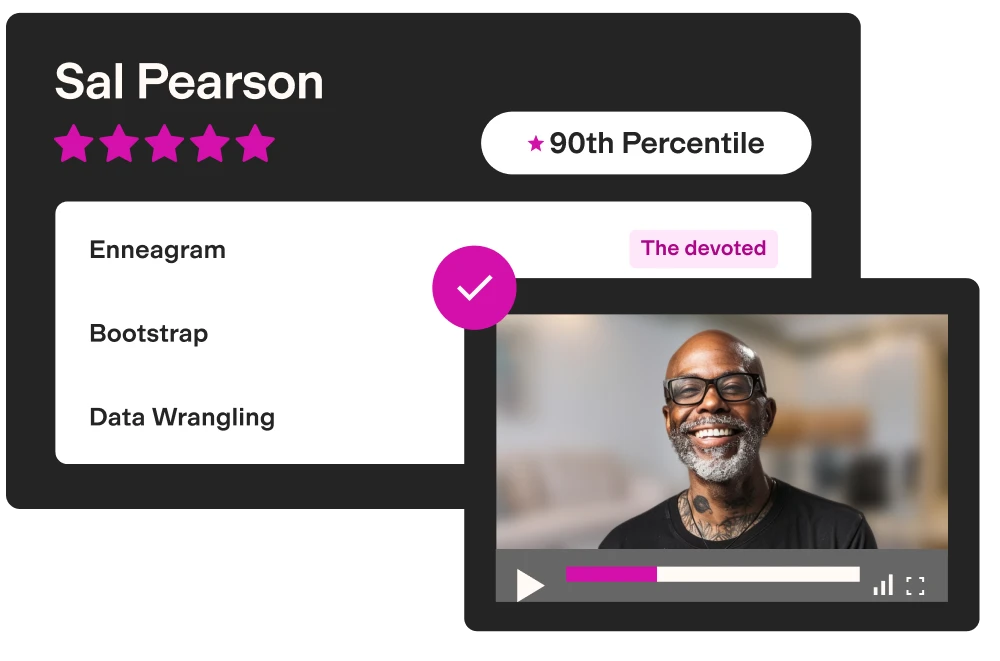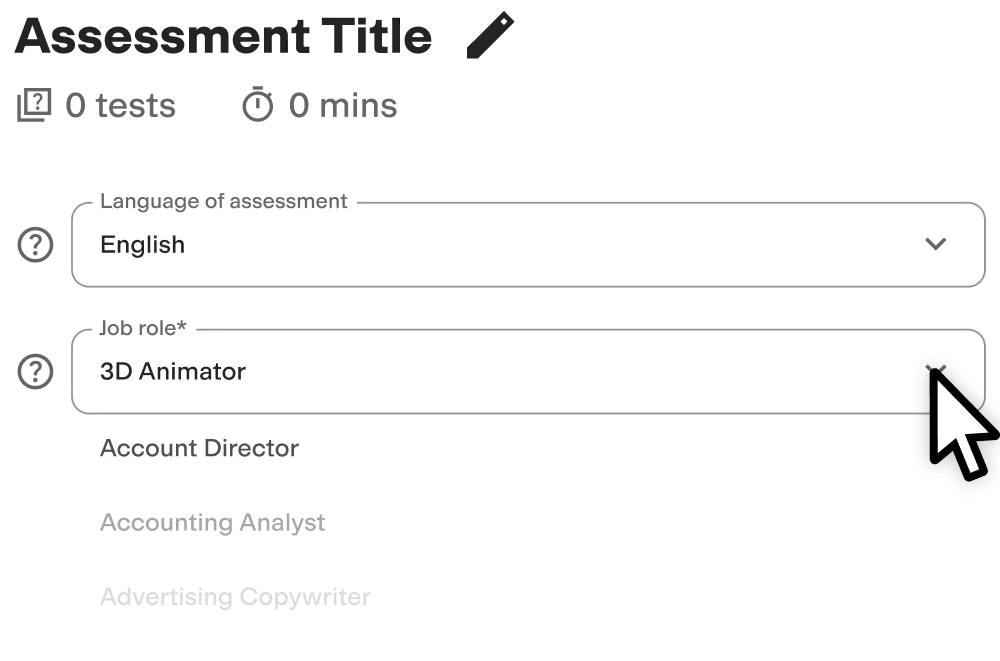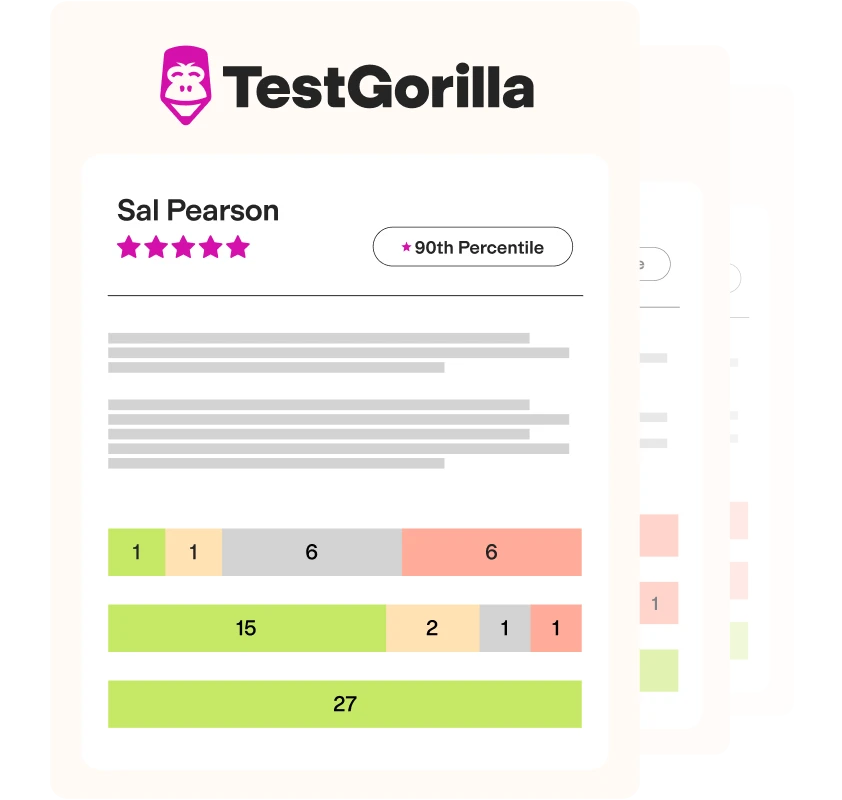16 Personalities test
Summary of the 16 Personality Types test
The 16 Types test gives insight into a candidate’s source of energy, the way they process information, how they make decisions, and the kind of lifestyle they prefer. This test helps you understand a candidate’s:
Preferences
Personality traits
Problem-solving
Work style
Interactions with others
Use the 16 Personality Types test to hire
All job roles. This test helps you better understand your candidates and current team members, have more meaningful interviews and development conversations, and build stronger relationships.
About the 16 Types test
Our test is based on the Myers-Briggs Type Indicator, also called the official MBTI 16 Personality test, an assessment created by Katharine Cook Briggs and Isabel Briggs Myers based on the work of Carl Jung and Jungian psychology.
This test is structured as a self-evaluation questionnaire that gauges preferences under different situations. The 16 personalty types test explores choices on four different spectrums:
Introversion (I) versus Extraversion (E)
Intuition (N) versus Sensing (S)
Feeling (F) versus Thinking (T)
Judging (J) versus Perceiving (P)
After taking the test, candidates receive their results in a four-letter combination, forming one of the 16 possible types, such as eNfp or isTj. In our 16 Type Personality test, the capital letters represent a particularly strong preference.
Check out our sample questions to see the questionnaire in action.
Our 16 Personality Type test gauges candidates on four main factors:
Preferences: Measures how a person prefers to work and live. For example, reliability versus spontaneity.
Personality traits: Gauges a candidate’s characteristics, such as being sociable, empathetic, or argumentative.
Work style: Evaluates how a person prefers to work. For instance, thriving independently or managing others well.
Interactions with others: Assesses how candidates build relationships. For example, being a strong coach or expertly navigating client relationships.
Our 16 Personality Types test reveals how we get our work done and perceive the world – our likes and dislikes, aspirations, and significant challenges.
The test results page of the 16 Personalities test offers a detailed description of the candidate’s personality type and tips on how different personality types can work with them to enhance team collaboration.
The test is made by a subject-matter expert
TestGorilla’s tests are created by subject matter experts. We assess potential subject-matter experts based on their knowledge, ability, and reputation.Before being published, each test is peer-reviewed by another expert, then calibrated using hundreds of test takers with relevant experience in the subject.
Our feedback mechanisms and unique algorithms allow our subject-matter experts to constantly improve their tests.
Sergei M.
Sergei is a Licensed Psychotherapist (Canada). He applies his deep interest in personality psychology in a business setting to achieve optimal personality-role, personality-group, and group-culture fit.
Having managed diverse teams of 20 to 70 employees, Sergei considers personality psychology indispensable for the modern manager. Sergei’s other interests include travel, chess, and cognitive-behavioral psychology.
Use TestGorilla to hire the best faster, easier and bias-free
Our screening tests identify the best candidates and make your hiring decisions faster, easier, and bias-free.
Create high-quality assessments, fast
Building assessments is a breeze with TestGorilla. Get started with these simple steps.
What is the 16 Types Personality test?
The 16 Personality test measures candidates based on four categories, each with two options or a dichotomy, resulting in 16 possible combinations. Here’s a quick summary of each typology:
Introversion vs. Extroversion: Your primary source of energy
Intuition vs. Sensing: How you gather information
Feeling vs. Thinking: How you make decisions
Judging vs. Perceiving: Your lifestyle preferences
What are the 16 personality types?
The 16 psychological types personality assessment takes these eight cognitive functions and combines them into 16 unique personalities that have different strengths and perceptions:
Type | Description |
ENTJ | ENTJs are natural leaders and determined extroverts. They delegate tasks well, are good debaters, and motivate people. |
ENTP | ENTPs are insightful, unbiased, and good at building relationships with team members. |
ENFJ | ENFJs are known for being lifelong learners. They’re eager to help and support colleagues. |
ENFP | ENFPs are excellent innovators and problem solvers. They are good team players and work well in groups. |
ESTJ | ESTJs work well in organized teams. They have a strong work ethic and put powerful effort into tasks. |
ESTP | ESTPs rely on facts and logic. They’re solutions-oriented and innovate on processes to streamline their work. |
ESFJ | ESFJs like taking the lead and creating structure in the workplace. They’re compassionate and care about the needs of the many. |
ESFP | An ESFP is an outgoing, extraverted entertainer. They enjoy the limelight and are great at building relationships. |
INTJ | INTJs excel at planning, implementing strategies, and taking on tasks step-by-step. |
INTP | INTPs are intelligent and creative and love troubleshooting issues and finding solutions. |
INFJ | INFJs prefer quieter work environments and are creative, empathetic, and insightful. |
INFP | INFPs are thoughtful and considerate, love encouraging others, and bring colorful enthusiasm into their work. |
ISTJ | ISTJs are reliable and consistent, with high conscientiousness. They love structured work and are accountable for all of their tasks. |
ISTP | ISTPs are good at breaking down, analyzing, and correcting complex problems. Introverted, they often prefer quiet surroundings. |
ISFJ | ISFJs are loyal and reliable in the workplace and prefer to take on tasks rather than delegate them. |
ISFP | ISFPs enjoy working independently and in teams. They thrive on learning, skills development, and agility. |
Why are the 16 personalities important to employers?
The 16 Types of Personality test shows how we work, manage situations, and make decisions. It determines how candidates perform in the workplace and helps you build a diverse team.
Understanding applicants’ work styles helps you communicate effectively, enhance development, and nurture working relationships. For example, it helps:
Inform growth plans: ENTJs make great managers who have strong leadership skills and know when to make tough decisions to help others succeed.
Create communication strategies: ISFPs prefer to work with concrete information and facts. Discuss specific feedback during meetings to help them understand and take action successfully.
Strengthen bonds: ESFPs need large amounts of socialization, so you make a greater impact when you touch base often and send small, thoughtful messages.
Personality style tests also inform interviews. Understanding an applicant’s personality helps you ask practical interview questions to determine how they interact with others and get their work done.
Adding a test for personality types into your recruitment process uncovers valuable insights. Lilab, a software company, uses our 16 Type Personality test to determine if candidates suit its work environment, boosting the company’s new employee retention rate by up to 90%.
What job roles can you hire with our 16 Personality test?
Our 16 Personalities types test can be used for all job roles and offers insights into any candidate, whether you’re hiring a sales representative or a graphic designer. Here are a few examples of different job positions and how the 16 Type personality test helps:
Project managers: With adaptable leadership skills, strategic communication, and conflict resolution abilities, an ENFJ is a powerful choice for this role.
Graphic designesr: An ISFP has the innovation and creativity for this job and works well independently, which is excellent as many graphic designers are freelancers.
Mechanical engineers: ISTPs are naturally curious about how things work and bring top-notch troubleshooting and problem-solving to an engineering position.
Sales representatives: ENTP and ESFP are ideal for this role, being charismatic and people-centric. ENTPs also thrive in a fast-paced environment, and ESFPs love building new relationships.
Consultants: Consultants need strong expertise in their chosen field, a commitment to continuous learning, and the ability to give unbiased advice, so INTJs make strong candidates.
How to combine personality tests with skills-based hiring
Personality style tests have been part of hiring efforts for some time, but they can flourish when you adopt a skills-based hiring approach.
Using personality tests alone or alongside resume screening can lead to biased hiring, but they give great insights into work style and communication preferences that complement technical and soft skills testing. In other words, when used together, personality tests and skills tests give employers the best chance to find qualified candidates well-suited for the job.
Create a multi-measure assessment: 4 tests to pair with the 16 Personalities test
Personality-type tests are an effective tool when used in multi-measure assessments. These assessments give you an accurate picture of the entire candidate by evaluating hard and soft skills, plus culture and personality traits.
Here are four tests you can use with our 16 Types test to make a solid multi-measure assessment:
Problem Solving test: Measure a candidate’s ability to use critical thinking to find solutions. Use it with the 16 personalities test to find workers who can quickly and creatively solve problems.
Time Management test: Gauge how job seekers and employees optimize their schedules and manage multiple tasks. When you combine it with the 16 Types test, you can discover how applicants prioritize their work.
Communication test: Assess a candidate’s communication skills, including nonverbal and written skills. Use it in combination with the 16 Personality Type test to measure people’s communication skill levels and preferences.
Culture Add test: Evaluate what an applicant brings to your company culture. Combining this with the 16 Types test helps you understand an individual’s personality and values to find the ideal addition.
Note: We haven’t included any role-specific skills tests here because they depend on the position you’re hiring for. However, we highly recommend you add at least one in your five-test assessment to ensure your candidates possess the right skills for the job.
FAQs
View a sample report
The 16 Personality Types test will be included in a PDF report along with the other tests from your assessment. You can easily download and share this report with colleagues and candidates.







